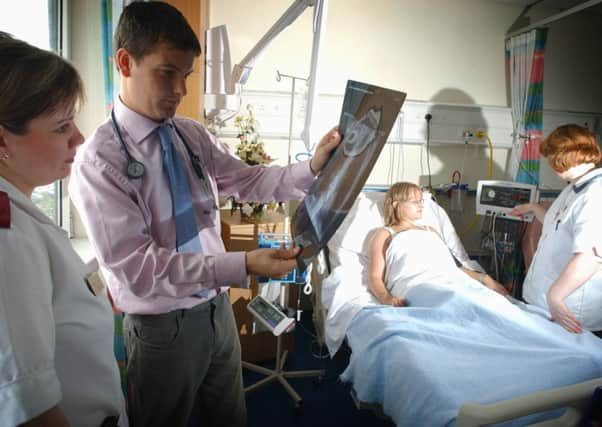Leaders: Budget cuts no excuse for poor healthcare


Yet, both in Scotland and south of the Border, there are growing incidences of poor or problematic patient care. Shortage of resource should not pass as an unquestioned excuse.
That is the background to the troubling report from Healthcare Improvement Scotland (HIS) into NHS Lanarkshire hospital standards. It was commissioned in the wake of data showing that Monk-lands hospital had higher than average mortality rates. It found serious problems with staffing, care quality and record keeping.
Advertisement
Hide AdAdvertisement
Hide AdThe review team interviewed more than 300 patients and carers, more than 20 health board staff and reviewed 152 patient records. It found no definitive causal links between the abnormal mortality figures and defective patient care, but at the same time did not rule this out, concluding that “it is possible that issues with the quality of care could contribute to avoidable deaths and that the hospital standardised mortality ratio (HSMR) is drawing attention to this”.
There are all sorts measures applied to every type of organisation. But surely one that measures death rates has to be acknowledged as a serious piece of work.
Health secretary Alex Neil said yesterday he expected “urgent” action to implement the recommendations. As well he should.
The review pinpointed no less than 21 areas for improvement across three hospitals for NHS Lanarkshire to undertake. The breadth of this list, and the evident need for urgency, clearly suggests that there is much remedial work to do within the authority to improve standards of patient care. It is clear that, while a HSMR is not by itself a definitive measure of the quality and safety of care, it serves as an important prompt for further investigation.
And the problems unearthed here are by no means confined to North Lanarkshire. As Dr Neil Dewhurst, president of the Royal College of Physicians of Edinburgh, points out, clinicians across Scotland will recognise the challenges facing colleagues in Lanarkshire, and that doctors and nurses were working “under severe pressure…insufficient senior review, particularly out of hours, an over-reliance on junior doctors and poorly resourced quality improvement systems contributed to a downward spiral of quality”.
NHS Lanarkshire says it has already begun to make improvements. But it is vital that the health minister ensures that there is sustained and effective follow-through and that changes are implemented as speedily as possible. He has asked that a formal review of progress on implementing the recommendations is undertaken by the end of March. Mr Neil should stay on the case, and keep the Scottish Parliament fully informed of progress.
Men-only club scores another bogey
Anachronism, noun: “a thing belonging or appropriate to a period other than that in which it exists, especially a thing that is conspicuously old-fashioned”.
Such is the dictionary definition that may suit Scotland’s oldest golfing society, the men-only Royal Burgess in Edinburgh, after it voted against proposals to allow women to join.
Advertisement
Hide AdAdvertisement
Hide AdPeaked caps off to Shona Malcolm, chief executive officer of the Ladies’ Golf Union, who said: “It’s encouraging that 43 per cent voted for change.” There’s a woman looking for the positive.
No-one can accuse the club of being undemocratic. The vote of members was decisive. Of the club’s 606 members, 418 were sufficiently activated to vote. And of those who voted, 56 per cent did not want to allow women into the club, while 43 per cent voted yes.
At this point, let us not forget the very positive benefits women members have brought to many golf clubs: ensuring continuing survival being one of them.
Those of a classical liberal persuasion may see in the defence of this continuing exclusion the upholding of the right of private clubs to be private, to retain their own membership rules and not to have their doors forced open by the demands of indiscriminate universalism.
But all rights have to be balanced and with rights come responsibilities. There is general agreement that a world where there is no discrimination against individuals on the grounds of race, religion, sex or sexual orientation would be a better, fairer place. General agreement, but not universal.
How sad and depressing that in the 21st century so many men are still prepared to discriminate on the basis of gender.